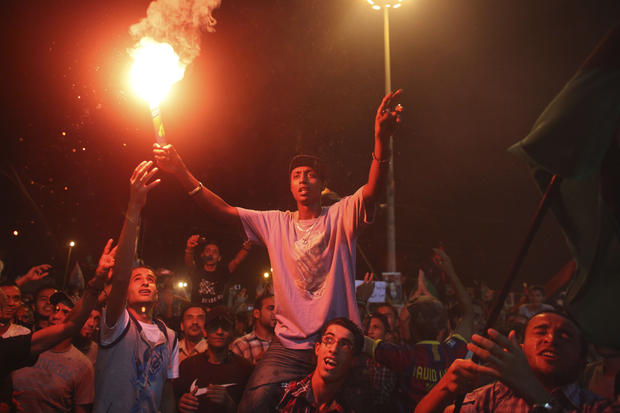Concerns abound for post-Qaddafi leadership
Last updated: 10:20 PM ET
There have long been concerns about what would happen in a post-Qaddafi Libya. After 42 years of dictatorship, creating the political infrastructure and constitutional framework for a more democratic future will be a significant challenge.
Concerns about a post-Libya government reached their greatest peak when Libyan rebel commander Abdel-Fattah Younis was assassinated in late July. The rebels claimed Qaddafi's troops had infiltrated their ranks to sow discord, but since the beginning of the six-month-old uprising, there was concern that Islamic militant elements were fighting with the rebels. Tribal issues could lead to ongoing, divisive battles within a new Libyan administration.
The Transitional National Council (TNC), made up of members from various areas and tribes, has been recognized by 32 countries as the representative of Libya's government. However, the TNC chairman, Mustafa Abdul Jalil, has not convened a cabinet meeting since August 8.
In addition, an estimated $30 billion in frozen Libyan assets to be dispersed to the new Libyan government is in play.
NATO has worked with the TNC to develop some plans, such as maintain some of Qaddafi's security forces, to maintain stability and order as a new government is formed.
Some of the more vocal rebel leaders have tried to portray confidence. Ahmed Bani, the opposition's military spokesman, told The Telegraph: "The people of Tripoli have suffering from a long time ago. We need their help with schools and hospitals and people will stay to make sure things are secure. Together we will overcome all these problems."
Muammar Qaddafi's regime is "clearly crumbling"Qaddafi calls on Libyans to resist rebel forces
Rebels take control of parts of Tripoli
Qaddafi: "You destroy our air conditioners"
Complete coverage: Anger in the Arab World
As the rebels closed in on Qaddafi Sunday, the U.S. State Department released a statement saying: "As Assistant Secretary Feltman's visit to Benghazi underscores, we continue efforts to encourage the NTC to maintain broad outreach across all segments of Libyan society and to plan for post-Qaddafi Libya."
President Obama issued a statement late Sunday evening calling for the TNC to demonstrate leadership and pursue a transition to democracy:
"Qadhafi needs to acknowledge the reality that he no longer controls Libya. He needs to relinquish power once and for all. Meanwhile, the United States has recognized the Transitional National Council as the legitimate governing authority in Libya. At this pivotal and historic time, the TNC should continue to demonstrate the leadership that is necessary to steer the country through a transition by respecting the rights of the people of Libya, avoiding civilian casualties, protecting the institutions of the Libyan state, and pursuing a transition to democracy that is just and inclusive for all of the people of Libya. A season of conflict must lead to one of peace."
One of the earliest tests of the new leadership will be what they do with Qaddafi himself, as well as his family and top members of his regime.
International Criminal Court Prosecutor Luis Moreno-Ocampo told The Associated Press that Seif Gaddafi had been detained by "rebel special forces," and that the rebels must remember "It is time for justice, not revenge." He expects the rebels to turn over those who have been issued arrest warrants for crimes against humanity, such as Qaddafi and his sons, to the international court in the Hague.
Moreno-Ocampo promised that, as far as the U.N. is concerned, "there is no more impunity for (Qaddafi's) crimes."
Daniel Korski, Senior Fellow at the European Council on Foreign Relations, told Reuters that after Qaddafi is gone, "The next few hours are key. From Iraq we know that the first days, weeks and months are key for any long-term stability. What happens to law and order, what happens to ex-loyalists is key. The worst that could happen is the collapse of the Qaddafi regime and a huge vacuum. The West must be there to support an orderly transition, resist crowing and taking the responsibility away from the Libyans yet make clear to the rebels they must hold to standards they felt Qaddafi never met."

